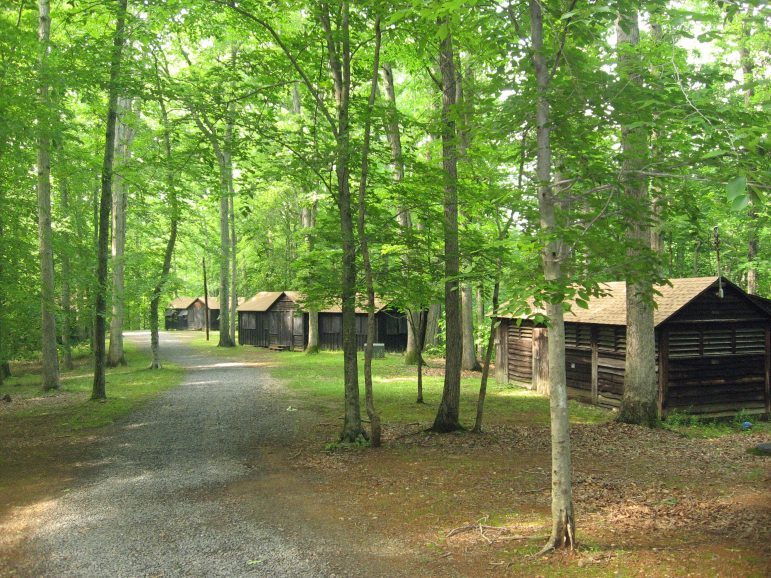In a camp mess hall in the woods of northern Alabama, a group of pre-teen girls is using a hairdryer–not to dry their hair, but to explore the effects of wind power on objects in this case: ping-pong balls.
The girls are from the Birmingham and Montgomery areas, from schools both public and private, both suburb and inner-city. They are here to get excited about science.
“See if it can do that!”, followed by cheers from the girls.
“We wanted to make very certain that we didn’t just get girls who make straight A’s”
Eileen Griffin is an education coordinator with Alabama Public Television. APT, along with the YMCA and Girls Incorporated of Birmingham, has co-sponsored the six-day “SciGirls” camp.
“We wanted to open it up to girls who are maybe making Ds or who maybe aren’t scholars, but who are challenging and questioning their world.”
SciGirls is a curriculum created by Dragonfly TV, a television series produced by Twin Cities Public Television and funded partly through the National Science Foundation. Its primary goal is to foster an interest in science in girls ages nine through 12.
“The Science Foundation saw a need for that and that’s because even in our 21st century, we’re not finding the numbers of girls and college women going into the sciences. We still have old things in our past about what a woman should be and should do.”
Griffin says reaching girls as they approach adolescence is especially important, since once girls get to high school the numbers interested in science and math drop significantly.
“What we’re finding is that girls need much more encouragement. They also – by research – learn sometimes differently than the boys. Science curriculums are still, often times, taught by men and written by men, and it?s not that that’s wrong, it’s just that girls learn differently.”
Girls, for instance, respond more readily to collaboration and teamwork rather than competition — the standard incentive for boys. So the SciGirls curriculum is designed with plenty of opportunities for discussion, small group work and hands-on problem solving.
“Then I think the other thing in the curriculum that’s powerful is film clips of 10 women scientists in the United States today — in their late 20’s all the way up to their 60’s — who are doing major research. So then I think the girls could see that it’s not just men in white lab coats.”
The SciGirls camp takes place at Camp Cosby, a 135-acre YMCA camp that sits along the wooded banks of Logan Martin Lake southeast of Birmingham just as it has for the past 83 years. It looks straight out of the movie, The Parent Trap, the original one, not the Lindsey Lohan remake, complete with red clapboard cabins and troops of kids marching from canoeing to horseback riding to the swimming pool.
Here, SciGirls like Latrice Goldwaith experience camp activities through a scientific lens.
“We’ve been doing a lot of experiments and today we got to choose one of our very own. I’m doing mine on the zip line, so I’m going to have to go on the zip line like a million times.”
The zip line — dubbed The Zoom by campers — takes kids on a harrowing diagonal ride from the treetops of the forest to a final splash in the lake below. Amanda ViConsallo is still pumped about her time on the Zoom.
“It was really fun because at first when I went up there they make you sit down and just jump off and it was really freaky because you see all the group beneath you and it’s 34 feet high but it’s really cool when you hit the water it’s so cool because you’re trying to do this really, really fast and you’re so nervous — and you start going faster and faster but it’s really fun.”
“This was a big leap for many of them,” says Eileen Griffin. “About half the girls had never been away from home?What I saw most this week was stretching their edges, personally as a human being, as a growing young girl, and as a learner, really pushing their edges.”
A few days into the camp, the girls are treating the once frightening zip line like a walk in the park. They ride it with buckets of water to test how weight affects speed or while unwrapping pieces of bumble gum to test coordination under duress. The instructors and Eileen Griffin praise them for their courage as well as their curiosity.
“And so you could see them taking in the lessons of SciGirls that are not only to fall in love with science but to know yourself.”
Kelsey Henderson says she hopes she gets to come to back to SciGirls camp next year for more hands-on experiences.
“I used to think of science as what we did in school with books. But now I see a whole new side of science, asking yourself questions and running experiments.”

